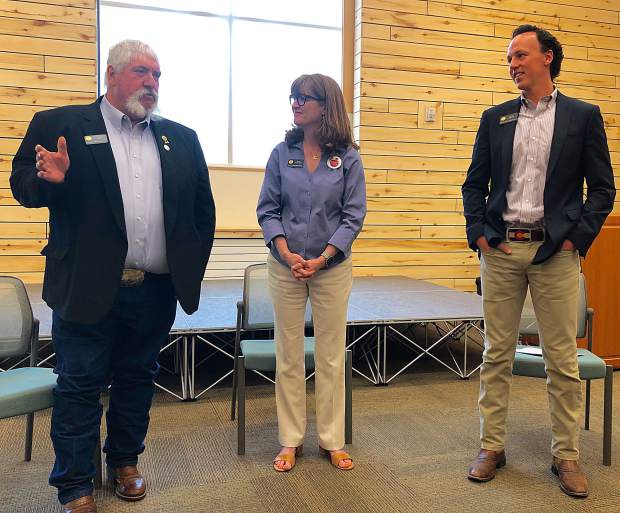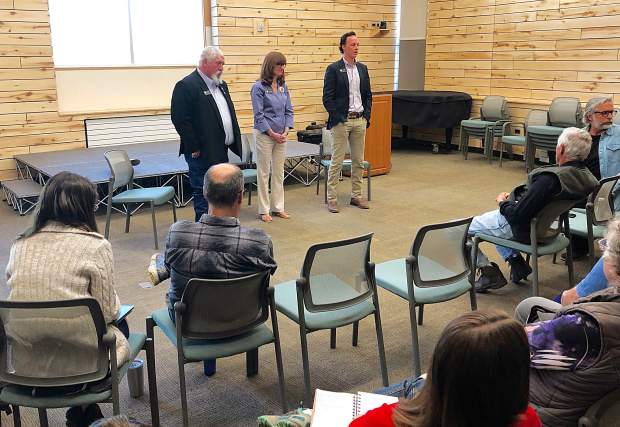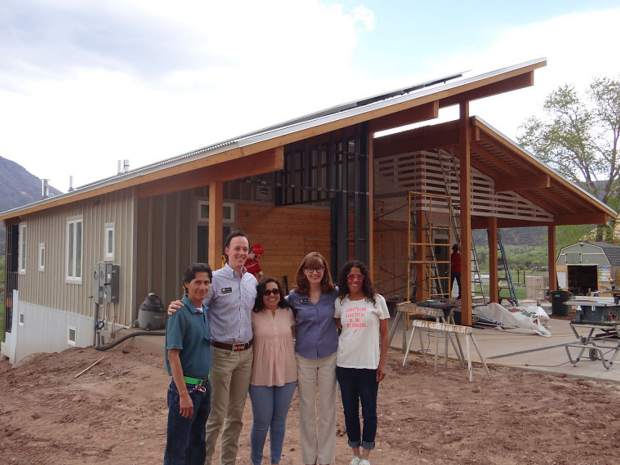
-
State representatives Perry Will, left, Julie McCluskie and Dylan Roberts held a town hall meeting in Basalt last week.
Scott Condon/The Aspen Times
-
Colorado state representatives Perry Will, left, Julie McCluskie and Dylan Roberts field questions from an audience in Basalt last week.
Scott Condon/The Aspen Times
-
Colorado State Rep. Dylan Roberts (second from left) and State Rep. Julie McCluskie (second from right) meet with homeowners at the Basalt Vista affordable housing project last week.
Habitat For Humanity/courtesy photo
State representatives from the Roaring Fork Valley claimed at a town hall meeting in Basalt last week that they are proof it’s possible to accomplish bipartisan governance in an era of tribalism.
Rep. Julie McCluskie and Rep. Dylan Roberts, both Democrats, invited Rep. Perry Will, a Republican, to attend their town hall gathering. McCluskie’s district includes Pitkin County while Roberts’ district includes Eagle County.
Will is a former area wildlife manager for the Roaring Fork Valley and Garfield County, who was appointed to the House District 57 seat late in the session when former Rep. Bob Rankin was appointed to fill the Senate District 8 seat.
Will’s district includes Garfield, Rio Blanco and Moffat counties.
In brief introductory comments, Roberts claimed legislators put aside party differences in the vast majority of issues they debated. Roughly 400 bills were introduced during the four-month legislative session.
“A good bipartisan town hall here, too,” Roberts said.
Will credited Roberts and McCluskie with helping him get acquainted with policies and procedures as a new representative, despite their party differences.
Roberts and Will were the House sponsors of a bill that will generate money for the Housing Development Grant Fund. The intent is to make funds available to expand the supply of affordable housing in Colorado, particularly in rural and mountain areas.
Roberts and McCluskie visited the Basalt Vista affordable housing project — a partnership between multiple entities in the Roaring Fork Valley — during their visit in Basalt. They labeled it an impressive model on how to accomplish affordable housing.
McCluskie said bipartisanship was also vital to proposing a way to generate much-needed funding for statewide transportation improvements.
She was one of the sponsors of House Bill 1257, which had bipartisan support to seek voter approval in November for transit and education funding. The state government must refund revenues that exceed annual limits by the Taxpayer Bills of Rights, also known as TABOR.
The state will ask voters if it can retain and spend the state revenues in excess of the limits. It doesn’t authorize a tax increase. It allows the state to retain revenues created by growth.
If voters approve that measure, companion legislation earmarks one-third of new funds for K-12 public education, one-third for higher education and one-third for transportation needs.
Colorado voters rejected two proposals to raise taxes for transit solutions in November.
The legislators also said progress was made on health care issues through multiple bills. The issue will remain an area of concern next year.
